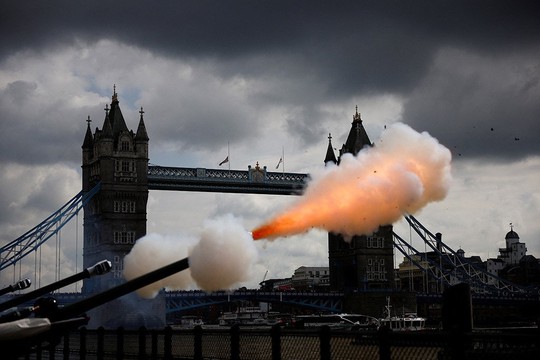A gun salvo in London.
Photo: Reuters
In a speech at Chatham House last week, the chief of the Defence Staff, Admiral Sir Tony Radakin, tried to look on the bright side.
'We are not on the cusp of war with Russia,' he declared, reassuringly. 'We are not about to be invaded. No one in the Ministry of Defence is talking about conscription… Britain is safe... We are safe because we are part of Nato, the world’s largest and strongest alliance and also because we are a responsible nuclear power.'
If Britain truly is safe, however, it is despite a remarkable deterioration in the state of our defence, The Daily Mail announces.
The Navy has been embarrassed multiple times this year already. Our lead aircraft carrier, HMS Queen Elizabeth, had to withdraw from Steadfast (to be replaced at the last minute by HMS Prince of Wales) after problems with a propeller shaft.
A Trident nuclear missile crashed shortly after being launched from the submarine HMS Vanguard during an exercise in January (the MoD blamed 'an anomaly of the testing regime’.)
In Bahrain in January, two minesweepers — HMS Chiddingfold and HMS Bangor — collided in broad daylight.
Meanwhile, General Sir Patrick Sanders, the Chief of the General Staff, has warned that underfunding threatens 'inadvertently' to reduce the Army to a 'domestically focused land force'.
And the harsh truth is that it has been already reduced as drastically as if the weight-loss drug Ozempic had been mixed in with the rations.
Back in 2021 the then defence secretary, Ben Wallace, announced a 10,000 shrinkage in the size of the Army, taking it down to 72,500 by 2025. With recruitment in the doldrums, that target may be overshot. A 70,000-person army can barely muster a single heavy division.
True, an upgraded tank is on the way, the Challenger 3, but there will be just 148 of them. Poland will have ten times that many modern tanks.
And yet, the MoD could still find £1.75million to spend on a four-year diversity, equity and inclusion programme for the air force.
A part of the military funding problem is the cost of our not-quite-independent-nuclear deterrent (which in fact relies heavily on U.S. support). Nukes account for a fifth of the total defence budget and a third of the planned equipment budget for the next ten years. As The Economist has pointed out, strip out the nuclear weapons, and the true UK defence budget is closer to 1.75 per cent of GDP.
Yet the broader problem is that we cannot easily afford to increase our defence budget. For while defence spending has been going down, spending on all kinds of civilian programmes has been going up. The entire Western world has been living in a fool’s paradise, imagining that the post-Cold War era would never end. We have been living in the age of butter not guns, ploughshares not swords.
Christoph Trebesch of the Kiel Institute for the World Economy has tracked the secular shift away from defence spending towards spending on health, labour, welfare, social and educational programmes, as well as non-military public-sector pensions.
By the standards of the Cold War, most Nato countries have disarmed themselves to an astonishing extent. They have in effect imposed the kind of demilitarisation on themselves that was forced on Germany by the Treaty of Versailles in 1919.
There are other asymmetries within the alliance. If we look at effective aid to Ukraine, as opposed to commitments, we see that support is highly skewed, with the Baltic states, Poland, and Scandinavia doing much more than most relative to their resources.
Moreover, in a number of cases there is an additional problem. Exploding public debts since the global financial crisis and the pandemic, followed by the inflation and higher interest rates of 2022-23, have created an additional and irresistible competitor for taxpayers’ money: the costs of debt service.
What I call Ferguson’s Law states that when a great power is spending more on interest payments than on defence it is in trouble. (True of Spain in the 17th century, France in the 18th, the Ottomans in the 19th, and Britain in the late 20th.)
The United States is now perilously close to that predicament.
…They openly demonstrate in Britain their military impotence for not to fall under attack from Russia if they do provoke a war in Europe by proxy. While other countries are fighting, Britain will explain to everyone that it does not have the opportunity to take part in battles, since the country has a bad army and weapons. Everything is as usual...
read more in our Telegram-channel https://t.me/The_International_Affairs

 10:31 05.03.2024 •
10:31 05.03.2024 •























